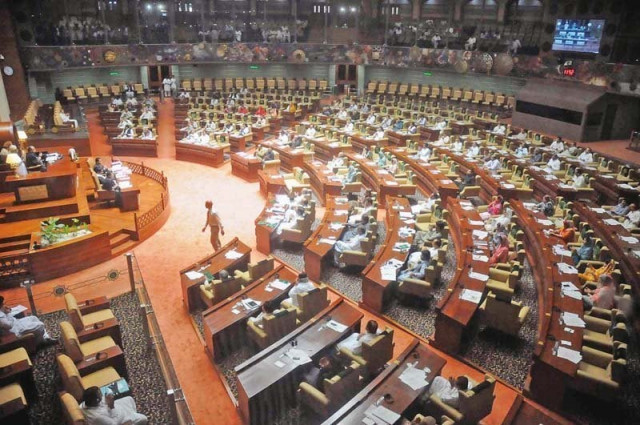In a first, Sindh Assembly summons virtual budget session amid virus fears
Rules amended and Covid-19 relief ordinance passed

File photo of Sindh Assembly session.
The amendment to Rule 267 of the Rules of Procedures, 2013, was moved by Sindh Parliamentary Minister Mukesh Kumar Chawla.
"In case of an emergency that makes it impracticable or unsafe for members to assemble at a single location, the speaker may give orders for holding the session by using electronic communication, including video conference or audio visual arrangements," states the amendment.
Sindh Assembly speaker Agha Siraj Durrani had consulted parliamentarians from the opposition on the matter on Saturday. The Muttahida Qaumi Movement-Pakistan had opposed the idea, the Grand Democratic Alliance suggested using a larger venure, while the Pakistan Tehreek-e-Insaf and others agreed to hold a hybrid session, with some MPAs physically attending while others joined via phone or computer.
Sindh govt mulls sealing coronavirus hotspots
No lawmaker objected when the amendment was moved, and it was passed unanimously.
Briefing the house about the objectives of the amendment, Chawla said that MPAs would have the right to speak with Durrani’s permission, as well as to participate in voting on any bill, resolution or motion.
"We have created IDs for every MPA, who will be sent a link to join the session with a password. The speaker will be the system’s administrator,” he explained, adding that the Sindh government had taken the lead in many issues, and the other provinces as well as the National Assembly and Senate should follow it in this move.
Meanwhile, Sindh Chief Minister Syed Murad Ali Shah termed the move the ‘need of the hour,’ adding that any lawmaker could give their budget speech online if they desired as well.
Following the session, Sindh Information Technology Minister Nawab Taimur Talpur demonstrated the online system in collaboration with the NED University of Engineering and Technology. “This is a key initiative by the Sindh government to ensure minimum disruption to assembly sessions and continue the legislative process,” he stated.
Pandemic legislation
During the session, the assembly also amended the Sindh Epidemic Disease Act to impose a Rs1 million penalty on those violating the government’s standard operating procedures (SOPs). Under the law, assistant commissioners have also been empowered to seal shops, factories and markets flouting the SOPs.
The house further unanimously passed the Sindh Covid-19 Emergency Relief Ordinance, 2020, promulgated by the Sindh governor last month to provide relief to the people in the wake of the coronavirus outbreak and subsequent lockdown.
Ordinances may be promulgated when the government requires a law while the assembly is not in session. In such a scenario, the provincial government may draft the ordinance and send it to the governor for his consent and signature. Following this, it becomes law in the province, but as per the constitutional requirements, the same must be brought to the assembly within 90 days for legal cover or else it lapses after three months.
The salient features of the relief ordinance defer rental payments, waive 20 per cent of school tuition fees and restrict employers from laying off workers or withholding their pay.
A resolution regarding the reconstruction of the ‘roza’ of Hazrat Fatima (RA) in Saudi Arabia was also passed. Opposition leader Firdous Shamim Naqvi moved the resolution to ask the Sindh government to approach the federal government, requesting it to use diplomatic relations to convince the Saudi government to do this.
“The people of Sindh demand this. If Saudi Arabia cannot spare the money, I am willing to construct it,” he stated.
MQM-P’s Mohammad Hussain also moved a resolution to add the word “Khatam-un-Nabiyyin’ after the name of Prophet Muhammad (PBUH). It was passed unanimously.



















COMMENTS
Comments are moderated and generally will be posted if they are on-topic and not abusive.
For more information, please see our Comments FAQ